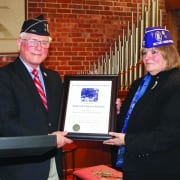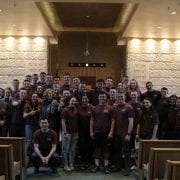What Can You Do About Anti-Semitism?
By David Levin, Post 425
It’s no secret that antisemitic and anti-Zionist activity has been on the rise in this country over the last few years. I use the term activity to include things happening online, demonstrations, rhetoric, real-world violence, student intimidation, as well as political posturing. Antisemitic incidents in the U.S. increased by 34% between 2020 and 2021 according to the Anti-Defamation League (ADL). These incidents are now at their highest level since the ADL started compiling information about antisemitism in 1979.
This is not 1933 Germany. No group is going around pulling you from your home because you are a Jew, look like a Jew, or consort with Jews. But people have been murdered because of Jew hatred, most notably at the Tree of Life Synagogue in Pittsburgh in October 2018. Antisemitism has been around in various forms for various reasons for thousands of years, and it will likely never be eliminated completely. This essay is written solely to get us thinking, and hopefully acting to make a dent in the problem.
I can’t begin to enumerate the pro-Jewish/Israel organizations who send me snail mail or email in the fight against antisemitism. They are working hard to educate and influence people through podcasts, conferences, literature, and lobbying elected officials. One wonders if they can reach the minds of the troublemakers or those most likely to cause trouble in the future. What can we do besides speak to like-minded people, stay informed, and support some of these wonderful entities financially?
We realize that no racial or ethnic group is homogeneous in their moral, cultural, intellectual, or physical attributes. But the hard-core antisemite lumps all Jews together, usually based on some perceived negative encounter or characteristic. One approach is to support educating gentiles, and sometimes ourselves, by emphasizing Jewish contributions to mankind as well as the Torah values that Judaism represents. The way in which these values have a commonality with other religions and cultures could be a foundation of this educational program.
The Holocaust Museum and Center for Tolerance and Education located at Rockland Community College (RCC) in Suffern, New York, led by Executive Director Andrea Winograd, has been working hard with student groups and community visitors in this area for many years, and is now in a new and expanded milieu. Besides the education efforts, promoting the concept of tolerance along with the baton of love and mutual respect to all we encounter will go far to achieve our goal. After all, how else can we legitimately call ourselves the light for all nations?
I recently saw the movie “Shared Legacies” at RCC, along with Jews, Blacks, elected officials, and other interested community members. It was a survey of the Civil Rights alliance between Blacks and Jews, with a focus on the close relationship between the Reverend Dr. Martin Luther King Jr. and Rabbi Abraham Joshua Heschel. When these two giants of their time passed on, in 1968 and 1972 respectively, the alliance, bereft of these leaders, began to wither away.
The point to be made is that a vigorous and successful response to antisemitism is unlikely without strong leaders and engaged followers who can overlook their differences and unite behind these leaders. In my opinion, both the lack of courageous and charismatic leadership as well as the lack of unanimity and common resolve among the followers has impeded the effort. Policy makers, interfaith clergy, leaders of educational institutions, businesses, and media, must all realize that intolerance and disrespect of the “other” has the potential to weaken our nation and is a threat to common humanity.
The late Lubavitcher Rebbe surmised that the avowed antisemite has a void in their life that they try to fill with Jew hatred because they were not exposed to Torah. For sure, unless explained by intellectual or mental deficiency, what logic could deny or distort the Holocaust, see Jews as a threat to white people, or rationalize the isolation or intimidation of Jewish college students based on their cultural beliefs?
Interestingly, the Rebbe felt that a possible strategy was to engage with leaders of some antisemitic groups in a quiet and diplomatic manner as an attempt to educate and possibly find some mutual understanding. So, what may be necessary are education, engagement, and a united effort to be an upstander rather than a bystander on this issue. That doesn’t mean risking an emotional or physical confrontation, but it does require a moral commitment, and sharing the love we all have within us.
Volume 76. Number 3. 2022










